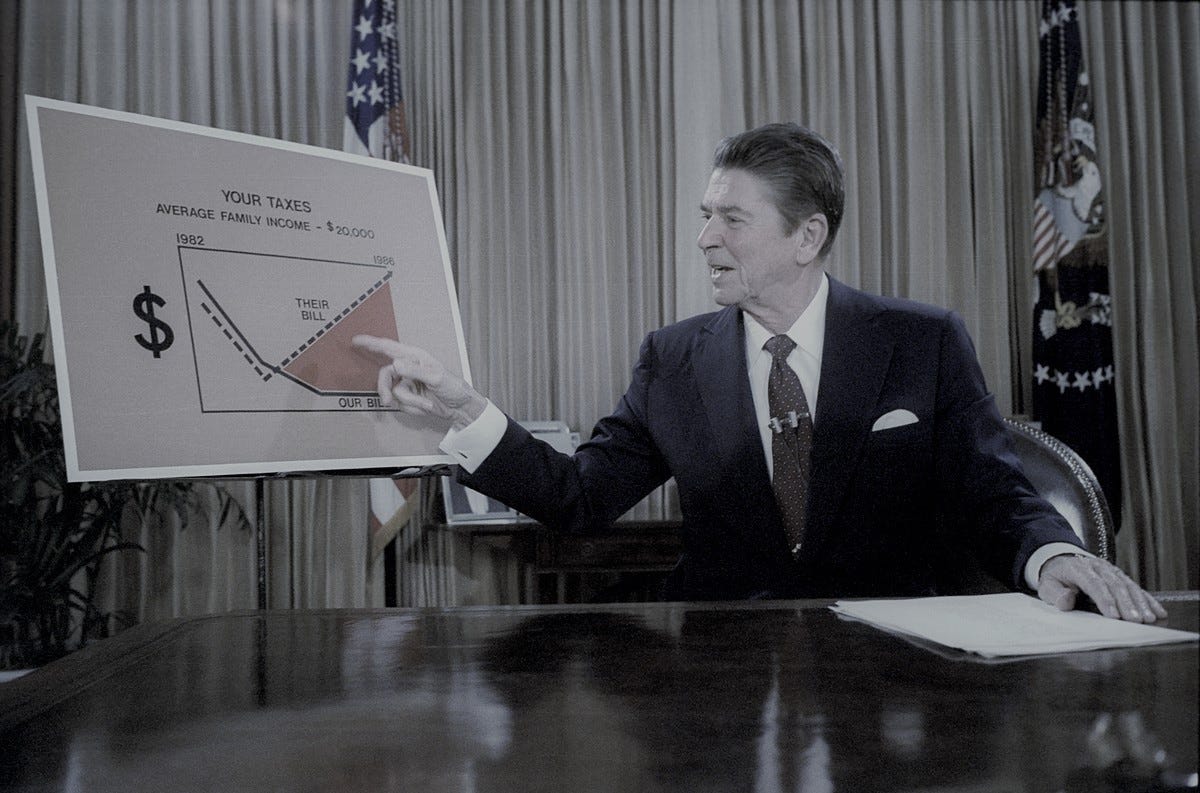
Our contemporary politics was altered by the "Reagan Revolution" and the larger rise of the New Right. After decades of a liberal governing consensus, Ronald Reagan fostered a new antipathy to the government, and thus, public spaces in general. Despite a belief that everyone can become rich, and also due to a history of exploitation, these spaces would be disproportionately relied upon by marginalized and impoverished populations. Still, architects of conservative policies, and this new antipathy to the public, had enough faith in their ideas (and pride from the outcomes of geopolitical events) that they may have felt a rising tide can lift all boats. Blind spots also form when the design lacks diverse perspectives from marginalized groups.
But the conservative ideology grew over time to become cartoonish and demagogic as small government meant stopping government altogether instead of pushing some of its functions into a more passive state. Still, the coalition welcomed policy solutions like overindulgent corporate deregulation, unwarranted tax breaks for the rich, and oversimplified social conservatism. It was made possible because some former New Dealers (usually in favor of reinforcing spending on social programs and military excursions) converted into Republicans on election days in late-20th-century America. The new governing consensus was meant to shrink government, but also expand its role in defense.
Obviously, this coalition still exists today. It’s just that many are approaching senior citizenship and now have to think about Medicare, Social Security, and also a younger generation that looks and thinks much differently while inevitably becoming their caretakers.
With this new indictment, Reagan’s coalitional cohesion continues to thin rapidly due to time, and demographic changes, as well as changes in the leading perspectives that discern, prioritize, and voice public problems.
Trumpism revealed the dark motivations regarding America's most recent pivot to a conservative-leaning center. Trade wars are not friendly to free markets, running up the debt (and then denying it) is not friendly to careful fiscal oversight, and punishing private entities with state power (because of diversity training) is not small government.
The policy framework that was built during the Reagan years has been thoroughly undermined but one thing is remaining: the use of fearmongering to exploit subliminal racism and pathological sexism. Those fears can help GOP grifters paint a picture of a reverse racist, multicultural Washington bureaucracy that is out to get good-natured, faith-filled Republican voters. Anti-government splendor, the way Reagan popularized it.
This was a mainstay of Trumpism as Trump picked on representatives of color, conspicuously called nuclear the forbidden “n-word” while referencing security talks with Russia, and the infamous attacks on migrants at the southern border and a Mexican-American judge’s jurisprudence.
These revelations of the dark side of America's recent conservative governing era have made different parts of the old Reagan coalition disparate in regard to their ability to garner cohesion around issues of morality, national security, and economic longevity.
The breakdown of national coalitions that favor one party or the other is a historic feature of American political life. The Reagan governing culture and reign of the New Right have become stale and are further detached from the real needs of the population than it ever was.
Thus, it's time for a new coalition of voters that can come together during election cycles to vote for a consistent governing agenda like many Americans did when they crystallized the goals of the New Right by giving the Republicans political power after a generation of having little national legislative power (due to the Great Depression).
Millennials and Zoomers can foster a new politics that isn’t blinded by deep-seated fears of multiculturalism or a social pathology that puts millionaires and billionaires on a pedestal while bluntly overlooking the nuanced realities of economic inequality and the perpetuation of a moneyed class that has not trickled down their wealth.







I’m a Baby Boomer and I support this message
A larger PROPORTION of gen x'ers voted for Trump in the last election than Baby Boomers. The BB NUMBERS were greater, due to the giant size of the cohort.
But I hope you are correct. The further left the better.